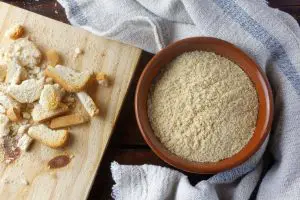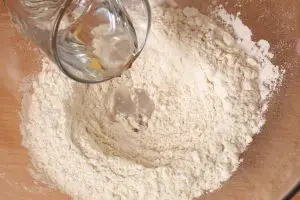Breadcrumbs are something a little tricky to define, considering how different the ones that you might purchase from a store are, when compared to some that you might make in your home. The truth of the matter, though, is that the jar in your cupboard won’t last forever – so let’s talk about keeping breadcrumbs in your kitchen.
How long do breadcrumbs last?
Breadcrumbs are, of course, so often used to make a crispy, chewy crust for all sorts of different things. For example, they may be mixed with flour and egg to generate a wonderfully crispy crust for any kind of baked dish, perhaps a baked pasta dish.
Breadcrumbs can also be used to soak up juices and flavors in order to distribute them a little better, spreading the wonderful flavors that you worked hard to create through a dish.
Since they’re as wonderfully versatile and useful as they are, it could certainly be argued that you ought to have a jar or two in your cupboard. The main reason that we would recommend them is that they pop up when you least expect it – a macaroni cheese recipe we recently tried had breadcrumbs listed as an ingredient for a topping. It was delicious, if unexpected.
So, when keeping grocery store breadcrumbs in your home, they will typically store well in a cupboard or pantry for around six months, or nine months in the fridge. This is only the truth if the breadcrumbs have a lid on their container – otherwise, the humidity of an environment can make them spoil much more rapidly
How long do fresh breadcrumbs last?
If you’re a fan of the zero-waste lifestyle, then you may be familiar with making your own breadcrumbs in your house. If the bread that you’re slowly working your way through is edging toward stale, then breadcrumbs can be a great step toward ensuring that you get something great out of them!
Bear in mind, however, that fresh breadcrumbs made in your home won’t contain any preservatives, which means that they likely won’t last as long as breadcrumbs from the supermarket. The best idea, therefore, is typically to make the perfect amount for the recipe that you are creating, and no more than that.
Freshly made breadcrumbs in your home will typically last an absolute maximum of two weeks. It doesn’t really matter where you place the sealed container with the breadcrumbs inside it, the breadcrumbs themselves will last around two weeks before they become a little unusable.
How to know if breadcrumbs are expired?
A great litmus test is to sample a couple of them, very quickly. The reason for this is that bread crumbs can lose flavor over time, due to evaporation and condensation of moisture within their container. Obviously, they should taste like small pieces of bread. If they don’t taste like that, then they’re likely expired, and shouldn’t be eaten.
This can also be said for a pack of flavored breadcrumbs. These may be used for roasting potatoes or stuffing poultry and can have various herbs and spices within them that boost their flavor characteristics.
If those spices and herbs have also lost their flavor, then the breadcrumbs are certainly too stale to be used. Flavor compounds will evaporate over time, and if this has taken place, the food is very likely too old to be worth eating.
Breadcrumbs may also have a sour flavor, which is an utterly terrifying red flag in most food. If this is the case with the breadcrumbs in your kitchen, then it likely means that bacteria have penetrated into the breadcrumbs themselves, leading to a bacterial colony that will, certainly, make you sick to some extent. If you eat those breadcrumbs, you’re opening the door to an upset stomach.
If you open a container of breadcrumbs and they have a sour, stale smell, then throw them away immediately – the food has gone from spoiled to rotten.
If breadcrumbs are made from bread, how do they last so long?
The basic reason that breadcrumbs can last for an exceptionally long time is that they’re essentially a totally dry environment. This means that they can be inhospitable for bacteria to live and thrive in, meaning that the dried bread can be stored for a long, long time.
When the bread is toasted in the factory, moisture content within it is boiled off completely, leaving a dry and, effectively, preserved, piece of food in the place of the previous loaf of bread. This is really handy for great breadcrumbs, and can lead to long-lasting food in your kitchen!
The second reason that breadcrumbs tend to last for a very long time while they’re in your home is that factory-made breadcrumbs generally contain a range of preservatives. These are very likely to include desiccants, which absorb moisture so that the breadcrumbs themselves don’t absorb the moisture. The end result is drier storage, which results in breadcrumbs being able to last a little longer in your pantry cupboard.
How to store breadcrumbs to get the most out of them
Breadcrumbs are, naturally, a very attractive place for a range of small bugs and rodents. They’re a carbohydrate, meaning that their complex molecules will change into sugars over time, which can attract a number of household pests.
For that reason, the best container for storing breadcrumbs is certainly something that’s strong and heavy enough that small pests won’t be able to gain access to it. This could include a metal container with a heavy or latched lid – even the smartest mouse in the world can’t flip a stiff latch.
If you buy breadcrumbs in a plastic or paper bag, as they’re sometimes stocked, we would recommend transferring them to a different, more hardy container. Rats and mice have powerful teeth and are quite used to nibbling away at something until they get through. In the end, they will likely gain access to your breadcrumbs, which is rather bad for everyone involved, but most especially for you.






